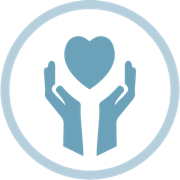What is Caregiving?
What Does Being an ALS Caregiver Mean?
Caregivers are individuals who provide physical and emotional support to help loved ones manage ALS.
Anyone can be a caregiver, but the role is usually undertaken by family members, such as a spouse, partner, sibling, parent, or adult child. The duties of a caregiver are unique to each situation, but they often include personal care; assistance with mobility, transportation, housework, grocery shopping, and looking after other family members’ needs. Some people with ALS may have a single caregiver; others can have several.
While being a caregiver can be a source of personal satisfaction, the work can also be very demanding. Family caregivers often provide care day and night and during weekends. Over time, this can place a heavy emotional burden on the caregiver, which can negatively affect their physical and psychological well-being. This may result in the caregiver overlooking their own needs, which threatens their ability to provide their loved ones with the best possible care.
There are many helpful tools and organizations that can provide information and support caregivers.
Anyone can be a caregiver, but the role is usually undertaken by family members, such as a spouse, partner, sibling, parent, or adult child. The duties of a caregiver are unique to each situation, but they often include personal care; assistance with mobility, transportation, housework, grocery shopping, and looking after other family members’ needs. Some people with ALS may have a single caregiver; others can have several.
While being a caregiver can be a source of personal satisfaction, the work can also be very demanding. Family caregivers often provide care day and night and during weekends. Over time, this can place a heavy emotional burden on the caregiver, which can negatively affect their physical and psychological well-being. This may result in the caregiver overlooking their own needs, which threatens their ability to provide their loved ones with the best possible care.
There are many helpful tools and organizations that can provide information and support caregivers.
Supporting Loved Ones
Equipment to Help People with ALS1

Recent advances in assistive technology and adaptive equipment can help people with ALS perform daily routines, maintain independence longer, and live more comfortable lives.
These can make your job as a caregiver easier, as well as reduce both physical and mental stress. Some of these tools include
These can make your job as a caregiver easier, as well as reduce both physical and mental stress. Some of these tools include
- Adaptive clothing: Clothing designed for people who have difficulty dressing. These make daily activities, such as dressing and using the bathroom, easier.
- Portable showers: Portable showers can be attached to any faucet, have waterproof sides, allow enough room for a wheelchair to roll in, and have a pump to allow water to flow out into the sink. These can be used if a person has difficulty accessing the bathroom.
- Bidets: If a person with ALS loses hand function, bidets offer a level of independence and can be added to any existing toilet.
- Emergency alert devices: These can give caregivers peace of mind in the scenario where a person with ALS falls and can’t get up. In this case, they simply push a button on a bracelet, pendant, or switch to alert the company operator, who then connects them with support.
- Cameras: Especially useful for caregivers who work remotely, cameras provide a means to monitor a person with ALS throughout the day.
- Home automation systems: These can allow people with ALS with limited or no hand function to remotely open doors, adjust thermostats, or turn on a TV and other electrical devices.
Know Your Rights
Caregiver Bill of Rights2

Remember, as a caregiver, your health and well-being are just as important as those of the person you’re caring for. Review the Caregiver Bill of Rights as a reminder that your needs matter as much as those of the person you’re caring for.
I have the Right to
- Take care of myself. This is not an act of selfishness. It will give me the capacity of taking better care of my loved one.
- Seek help from others even though my loved one may object. I recognize the limits of my own endurance and strength.
- Maintain facets of my own life that do not include the person I care for, just as I would if he or she were healthy. I know that I do everything that I reasonably can for this person, and I have the right to do some things for myself.
- Get angry, be depressed, and express other difficult feelings occasionally.
- Reject any attempt by my loved one (consciously or subconsciously) to manipulate me through guilt, anger, or depression.
- Receive consideration, affection, forgiveness, and acceptance for what I do for my loved one for as long as I offer these qualities in return.
- Take pride in what I am accomplishing and to applaud the courage it has sometimes taken to meet the needs of my loved one.
- Protect my individuality and my right to make a life for myself that will sustain me in the time when my loved one no longer needs my full-time help.
- Expect and demand that as new strides are made in finding resources to aid persons in our country, similar strides will be made toward aiding and supporting caregivers.
--Adapted from Jo Horne, author of CareGiving: Helping an Aging Loved One
Coping With Burnout
Understanding Burnout and How to Manage its Effects3
Being a caregiver requires a great deal of effort and energy. Over time, these expectations can take a toll on us, and we may run the risk of burning out.
What is burnout?
Burnout can be defined as an overexertion of physical or emotional strength, usually as a result of prolonged stress. Burnout can be as subtle as lacking motivation or feeling disconnected to more serious complications.
What causes burnout?
Common causes of burnout are a desire for perfectionism, the feeling that our work is never ending, or we’re performing impossible tasks that involve multitasking and self-sacrifice.
Symptoms of burnout:
Common symptoms can include interpersonal problems, health problems, poor performance due to lack of productivity, substance abuse, workaholism, depression, and loss of self-esteem.
What is burnout?
Burnout can be defined as an overexertion of physical or emotional strength, usually as a result of prolonged stress. Burnout can be as subtle as lacking motivation or feeling disconnected to more serious complications.
What causes burnout?
Common causes of burnout are a desire for perfectionism, the feeling that our work is never ending, or we’re performing impossible tasks that involve multitasking and self-sacrifice.
Symptoms of burnout:
Common symptoms can include interpersonal problems, health problems, poor performance due to lack of productivity, substance abuse, workaholism, depression, and loss of self-esteem.
Solutions for Dealing With Burnout Include

Taking care of yourself
Eat healthy, sleep, exercise, and reduce stress.
Eat healthy, sleep, exercise, and reduce stress.

Practice stress-reducing strategies
Breathing exercises, yoga, relaxation techniques, and getting a massage.
Breathing exercises, yoga, relaxation techniques, and getting a massage.

Develop a strong support system
Surround yourself with friends and family, join or create a support group, and/or see a counselor or therapist.
Surround yourself with friends and family, join or create a support group, and/or see a counselor or therapist.

Create a more fulfilling life
Only say “yes” to what you want to say “yes” to and acknowledge your priorities.
Only say “yes” to what you want to say “yes” to and acknowledge your priorities.
Tanabe Pharma America, Inc. does not provide medical advice, diagnosis, or treatment. The health information contained herein is provided for general educational purposes only. Your healthcare professional is the best source of information regarding your health. Please consult your healthcare professional if you have any questions about your health or treatment.
References: 1. Caregiving: How Durable Medical Equipment and Assistive Technology Supports Caregivers. ALS Association website. https://www.als.org/webinars/caregiving-how-durable-medical-equipment-and-assistive-technology-supports-caregivers. Accessed October 14, 2025. 2. A caregiver’s bill of rights. Family Caregiver Alliance website. https://www.caregiver.org/resource/caregivers-bill-rights/. Accessed October 14, 2025. 3. Coping with burnout. ALS Association website. https://www.als.org/navigating-als/for-caregivers/coping-burnout. Accessed October 14, 2025.


